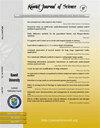研究生物炭对甲烷气体排放的影响及其对肠道发酵的影响
IF 1.2
4区 综合性期刊
Q3 MULTIDISCIPLINARY SCIENCES
引用次数: 0
摘要
本研究旨在评估生物炭对甲烷气体排放的影响,并调查其对肠道发酵的影响。研究测量了纳伊米母羊反刍动物的甲烷气体排放量,并将动物分为两组,每组 14 只母羊。处理组喂食生物炭和基础日粮的组合,而对照组只喂食基础日粮。结果表明,两组动物在第 0 天的初始气体排放量均为 1082 ppm,在日粮中添加生物炭可显著(P<0.05)减少 65.58 % 至 78.39 % 的甲烷气体排放量。此外,与对照组相比,用生物炭和基础日粮饲喂 Naeemi 羊,体重(63.66 千克)和生长速度(体长:79.3 厘米,腰围:81.75 厘米,身高:99.76 厘米)均有显著提高(P<0.05)。此外,生物炭还将平均体况评分(BCS)提高到 3.56,而对照组的评分为 2.83,这主要是由于生物炭对脂肪增长产生了积极影响。研究表明,生物炭能提高牲畜的养分利用率,提高饲料效率,并显著减少甲烷气体排放。在羊的日粮中添加生物炭,可以改变消化过程,促进营养吸收。本文章由计算机程序翻译,如有差异,请以英文原文为准。
Investigating the impact of biochar on methane gas emissions and its effect on enteric fermentation
This study aims to evaluate the impact of biochar on methane gas emissions and to investigate its effect on enteric fermentation. Methane gas emissions from Naeemi ewes’ ruminants were measured, with animals divided into two groups, each containing 14 ewes. The treatment group was fed a combination of biochar and a basal ration, while the control group received the basal ration alone. The results demonstrate that the initial gas emission for both animal groups at day 0 was 1082 ppm, and the inclusion of biochar in the diet significantly (P<0.05) reduced CH4 gas emissions by 65.58 % to 78.39%. Furthermore, feeding Naeemi sheep with biochar and the basal ration led to a significant (P<0.05) increase in body weight (63.66 kg) and growth rate (length: 79.3 cm, waist: 81.75 cm, and height: 99.76 cm) compared to the control group. Additionally, it raised the average body condition score (BCS) to 3.56, in contrast to the control group's score of 2.83, primarily due to the positive impact of biochar on fat gain. The study revealed that biochar enhances nutrient utilization, improves feed efficiency, and significantly reduces methane gas emissions in livestock. When incorporated into the sheep's diet, biochar can modify digestive processes and promote better nutrient absorption.
求助全文
通过发布文献求助,成功后即可免费获取论文全文。
去求助
来源期刊

Kuwait Journal of Science
MULTIDISCIPLINARY SCIENCES-
CiteScore
1.60
自引率
28.60%
发文量
132
期刊介绍:
Kuwait Journal of Science (KJS) is indexed and abstracted by major publishing houses such as Chemical Abstract, Science Citation Index, Current contents, Mathematics Abstract, Micribiological Abstracts etc. KJS publishes peer-review articles in various fields of Science including Mathematics, Computer Science, Physics, Statistics, Biology, Chemistry and Earth & Environmental Sciences. In addition, it also aims to bring the results of scientific research carried out under a variety of intellectual traditions and organizations to the attention of specialized scholarly readership. As such, the publisher expects the submission of original manuscripts which contain analysis and solutions about important theoretical, empirical and normative issues.
 求助内容:
求助内容: 应助结果提醒方式:
应助结果提醒方式:


